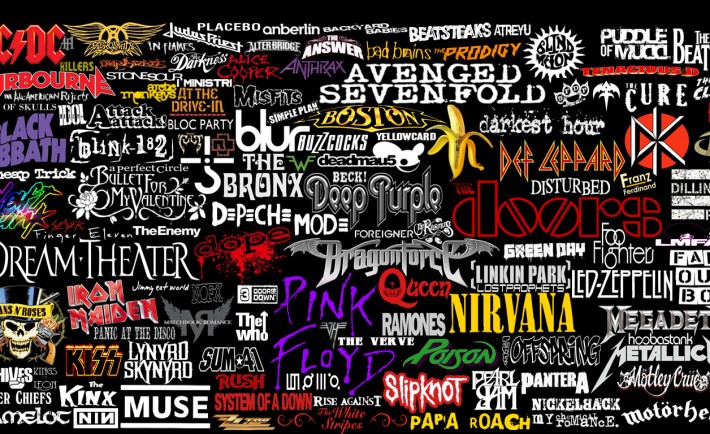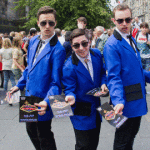Naming Your Band
By David A. Barber
Author of Gigging, Everything You Need to Know About Playing Gigs (Except How to Play Your Axe)
So, you have a new band, you’ve been jamming a little, have some songs worked up, you’re considering playing out or recording, but you’re still struggling with what to name the band. We are continually amazed by the creative names that bands come up with. There never seems to be an end to them, however, sometimes a band comes up with something that just leaves us wondering, “What were those guys thinking?”
Here’s a few things to consider when naming your band:
A great band name should be short and easy to remember. Common words that every child knows but aren’t already associated with music are the best. Examples: Hole, Garbage, The Samples, More Than Medium, and Ocean.
We are a big proponent of naming the band after the leader. Examples: Nina Storey, Wendy Woo, The Jill Watkins Band. These band names have the added bonus that the lead singer can never be fired from the band (without them having to change the name, anyway) but any other band member could conceivably be replaced.
Some common mistakes that bands make when naming themselves include:
- Always check to make sure another band isn’t already out there using your preferred band name. A quick Google search should do the trick, there.
- Avoid using unusual capitalization or punctuation, like: “nGOma,” “The FaiL-YeRZ,” “P-Nuckle,” or “Yo, Flaco!” The reason that this is a problem is that most club owners aren’t going to remember correctly, or even care very much if they get it right and therefore, the signs will read “Ngoma,” or “The Failures,” or “Pinochle” instead of the correct spelling. These same club owners will have trouble with the advertising they run in the local papers/magazines and on their websites, where those kind of capitalization and punctuation issues can create havoc with a database.
- Avoid Names that are too long: “Eddie Clendening & the Blue Ribbon Boys” is likely to be cropped down to “Eddie Clendening” or just “The Blue Ribbon Boys” when advertising space is at a premium.
- Avoid Names that are not easy to spell. If the band leader doesn’t make sure to spell his name from the stage at every opportunity and with the booking manager, he’s likely to see it posted as “Eddy Klendenning and the Blue Ribbon Boys.” Fans trying to find the website will not likely remember if it was “Eddie” or “Eddy” and how many n’s are there in “Clendening?” “The Blue Ribbon Boys,” though, is a fine name. Our all time best example of a bad band name was the short-lived “Scheherazade.” Not only was it hard to spell, but nobody could pronounce it either.
- It’s OK to make up a new word or use one that isn’t well known, but make sure you are consistent with explaining the pronunciation or spelling. “Xiren” (pr. Seerin) and “Marcy Baruch” (pr. bah-ROOSH) struggle with this constantly. It really stinks when you hear a radio personality struggle with pronouncing your name on the air.
- Be wary of names that use uncommon words. “Potempkin Square” (named for a famous location in Moscow) quickly became known in the local scene as “Pumpkin Square” because it was much easier to remember, to spell, and was way more amusing.
- Avoid the trend of using inappropriate business words like “…Records,” “Management,” or “Inc.” This does not make people think you are more serious about the music business. This tells people that you don’t know the difference between your band/act and a management company or a record label. We’re not saying you shouldn’t have your own label, we just think the group should have a unique name, different than your label, management company or whatever else you have going on.
- If you use the words “jazz,” “funk,” or “blues” (or any other genre) in your band name, you better play that kind of music. “Buckner Funken Jazz” plays mostly funk, but they miss out on some gigs because people who want to hire a funk band think they are a jazz band and people who want to hire a jazz band don’t like the word “funken” (which is commonly mispronounced). Likewise, if you use the word “theater” in your band name, be theatrical.
In the end, if a band is good enough, they can overcome a lousy band name. “The Fabulous Boogienauts” rose to the top of their local scene, but for the first six months, nobody got “Boogienauts” spelled correctly.
If you’re really stuck, try the old trick of naming the band after the street where you practice, live, or like a lot: Examples: Ben Park Drive, Battery Park, and Rose Hill Drive. Pet names work pretty well too. “Rosco” is a good example.
There are also ample online resources for naming your band. Just type “band names” into Google and you’ll find a variety of sites from band name suggestions and automatic name generators to lists of cool names already taken and online registries to make sure nobody steals yours.

 Previous Post
Previous Post Next Post
Next Post